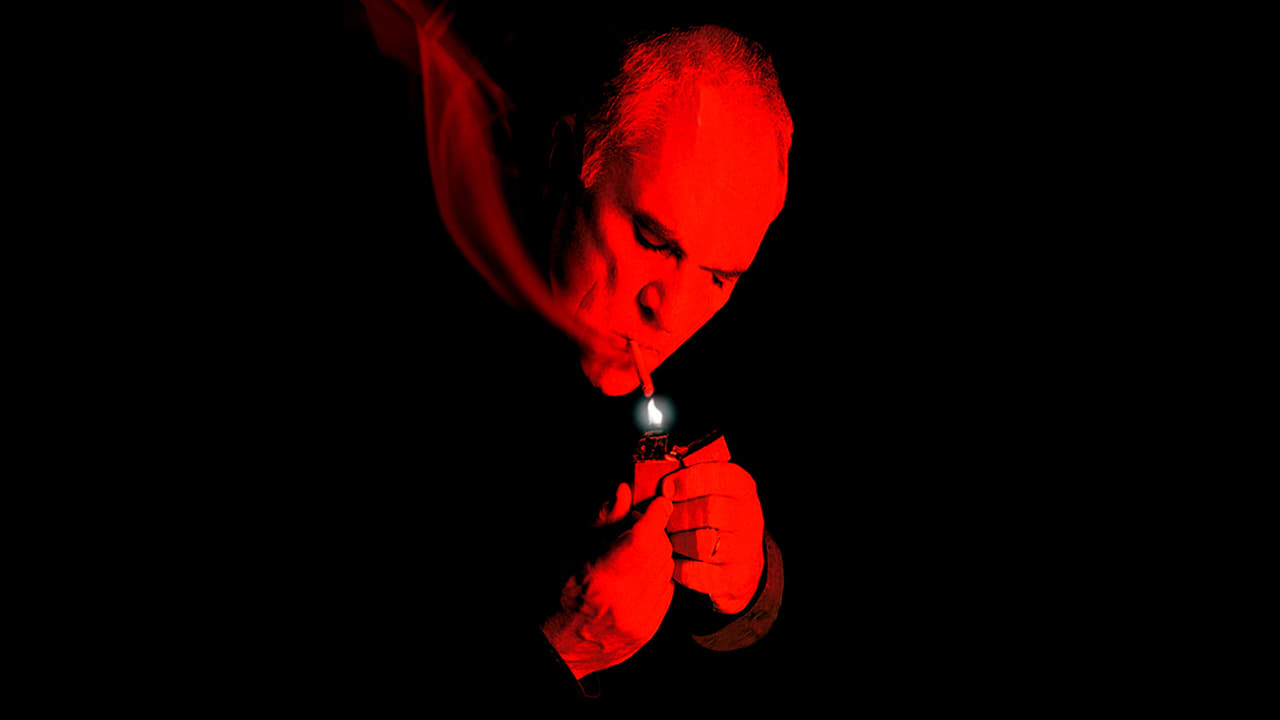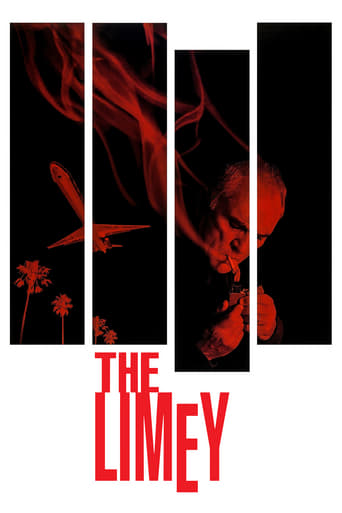Protraph
Lack of good storyline.
Brightlyme
i know i wasted 90 mins of my life.
Smartorhypo
Highly Overrated But Still Good
KnotStronger
This is a must-see and one of the best documentaries - and films - of this year.
johnnyjeremymusic-56956
I have never seen Poor Cow, but based on its synopsis it would be fair to wager that this is an update of that film. I suspect that the young Terence Stamp flashbacks in the Limey are from Poor Cow.The Limey is a fair film. It is an enjoyable film. The directors' style is very much of its time, but in the end the film is very conventional. If you're a fan of Terence Stamp, it is worth the watch but it has little else to offer.
videorama-759-859391
I don't think I've ever seen a film, try as much as The Limey. Sadly it's a movie, dressed up more than it is, a straight out revenge story told in Tarantino-esque sort of way with many repeated annoying clips, if a walking shot, or what a revenge driven ex con, Stamp, wants to do to a seedy Music executive, Fonda. It's great watching an unhinged Stamp, where he has his moments and does sometimes lay it on thick, but that's what makes it fun. He flies out to L.A, hell bent on finding out the real truth, about his dead daughter, Oz's Melissa George, who might as well not exist in this, where Fonda has shacked up with a new teen hottie, and seriously some scenes near the end, with their little trip, had "Why bother?" or "What's the point" moments to em'. Lesley Ann Warren, was wasted here as a casting director, whatever, while Luiz Guzman, a Soderburgh favorite, who wrote him, about his daughter, was a gladdened presence who teams up with Stamp, crashing Fonda's house party, whatever. When you find out the truth, it's really kind of a let down, if cliché'd. This is the SS film that sat between Out Of Sight and Traffic. This, with it's story tricks and shots, tries to pull the wool over the eyes, with an unimpressive, lightened story line, ala revenge motivated tale, where Stamp's sometimes over acted moments, epitomizes the film's frustrating trying efforts, yet still, The Limey is still a film of interest, you should see, esp, if a Soderburgh fan.
zacknabo
The Limey a juicy revenge flick to really sink your teeth into. This at the tell end of the '90s when Soderbergh still a young man at his innovative best, willing to try things structurally that he would eventually back away from in his post '90s work (with of course a few exceptions). Wilson's (Terence Stamp) daughter Jenny is dead. Her last known lover was Terry Valentine (Peter Fonda), a nefarious music "promoter" who cashed in on the style, sound and myth of 1960's zeitgeist, who is known to be connected with shady businesses and equally shady characters. Now, Wilson, estranged father, lifetime criminal, freshly out of prison, is on a mission to find out why his daughter was killed, then possibly take out the man whom he believes murdered her. The intense tale of revenge is set against the backdrop of high-end Hollywood Hills enclaves, the scenic beauty of Big Sur and the more gritty elements of Los Angeles adding texture. Wilson tries to accomplish this vengeance with the help of his daughter's friends: One, an aloof chef who she met in acting class, Eduardo (Luiz Guzman). Guzman's character in particular allows for the creation of a tête-à-tête buddy movie that creates heart, humor and an unexpected element in a film that belies the fact that it is not your run of the mill revenge film, which ends up being more of an existential quest than the shoot'em up tropes of the genre. DP Ed Lachman does a wonderful job with the long takes. In which he keeps most of the violence at a distance, which is unusual for the genre, but brings more mystery, intensity and uniqueness to the film. The first scene of ultra-violence is when Soderbergh and Lachman keep the camera across the street from a warehouse where Valentine's cohorts work. We watch Wilson briskly walk back to the building in which he just had his a** beat and was thrown to the curb, but all we hear are screams, the ringing of gunshots, and a few flashes of gun blasts until finally a young man comes running out toward the camera, into the foreground and past the camera, half-chased by a double gun toting Wilson (face covered in blood splatter) screaming in his intense cockney accent, "You tell'im I'm coming! You tell'im I'm f*****g coming!!!" The detached long shot works just as well in another famous scene at Valentine's part in a posh mansion that overlooks the canyons. In the foreground Valentine mingles, safe, untouchable, but through the glass the viewer begins to see what Valentine sees, Wilson throwing a 400lb bodyguard over the railing into the canyon to his demise.The disjointed storytelling, the non-linear elements, the displacement of matching dialogue with scenes in which they don't belong, the obscuring of timelines and the way Soderbergh obscures the framing of certain scenes is an inventive way to keep the audience on their toes. I know it is the opinion of some that this is more of a literary device and not a filmic style device…but those folks are wrong. Soderbergh and writer Lem Dobbs work well in dipping back to the past '50s and '60 American and English noirs and New Wave crime dramas as well as French New Wave aesthetics for inspiration while making something fresh and new that is all their own, exploding with vital energy. Soderbergh also made casting decisions (Stamp and Fonda) that in themselves are aware and self-referential in themselves, from the aura, myths and careers of Stamp and Fonda have been associated with. Soderbergh even makes a genius choice to show flashbacks of Wilson that are actually vintage footage of Terence Stamp playing a character in Ken Loach's 1967 debut Poor Cow. These techniques had to be fresh in 1999 as it is still fresh today. Stamp is at his witty, faux-standoffish best (reminiscent of Stephen Frear's The Hit), with a quick fire half intelligible parlance that is simply perfect for the idiosyncrasies of this film. Guzman proves why he is maybe the most talented and versatile Latino actors we have working in America today. On the other hand Peter Fonda cannot act; he never could. All of that talent was drained by his father and his sister, but in the context of what was needed from his character in The Limey, it works, and is charming, much in the way a singer who doesn't have a "naturally great" singing voice or makes a habit of not singing in key, i.e., Lou Reed is charming and ultimately works. And as the sometimes subdued, but always neurotic, sun baked, Southern Cal ex-hippie, Peter Fonda could not have been a finer choice.The Limey is just different. Rememberances of an indie culture that has changed. Because it isn't often that there is a revenge-laden crime thriller that on the surface should be about drugs, guns, sex with beautiful women and straightforward Charles Bronson revenge that winds up being about what is truly important in a person's life: family, learning from one's experiences. As Stamp says, "If prison has taught me one thing it is how to bide my time…bide my time so I can think clearly and make the right decision." This is one of the most poignant soliloquies in The Limey. But I believe Roger Ebert said it best in his 1999 review, this film is really about "retirement."
patrick powell
A phrase I have used before in these 'ere reviews is 'there's less to this than meets the eye, and risking devaluing it through overuse I'll use it again about The Limey as it sums the film up extremely well. Stephen Soderbergh is a darling director of cineastes and for all I know he was attempting something far more subtle than what we are ostensibly presented with. If so, it was far, far too subtle for this viewer. I read elsewhere that The Limey is a Soderbergh meditation on retirement, but I don't got for that at all. The Limey is, to be blunt, a straightforward account of how Terence Stamp's limey ex-con travels to Los Angeles to seek revenge for the murder of his daughter.Why he had decided it was murder - it was, of course, because this is Hollywood life not real life - is never made clear at all. All in all The Limey is a somewhat banal and unconvincing thriller about a man taking his revenge, but Soderbergh attempts to raise it to a higher plain with the use of artsy-fartsy editing. It doesn't come off. The Limey is by no means bad, but neither is it much of an interesting film either. Go and see it by all means as it is entertaining enough, but there are enough films with the same theme as this which are, quite simply, better, artsy-fartsy editing or no artsy-fartsy editing. I might well have missed the point, but if I have, I suspect the point didn't really amount to a row of beans, and, anyway, I really don't care.

